- Sunday Seminole Summary: FSU Football Adds Pair of WR Transfers
- Sunday Seminole Summary: FSU Football Exits ESD With Top-15 Class
- Sunday Seminole Summary: FSU Soccer Tops BYU for Third National Championship
- Sunday Seminole Summary: FSU Soccer Advances to National Championship Match
- Seminole Sunday Summary: FSU Soccer Heads Back to College Cup
- Seminole Sunday Summary: FSU Soccer Reaches Sweet 16; Football Tops Boston College
- Seminole Sunday Summary: FSU Soccer Wins ACC, Advances to Second Round of NCAA Tournament; FSU Football Rallies Past Miami
- Seminole Sunday Summary: FSU Soccer Tops Wake on OT to Advance to ACC Final
- Seminole Sunday Summary: FSU Football Crushes UMass for Third Straight Win
- Seminole Sunday Summary: FSU Soccer Stays Perfect with Pair of Wins
Sunday Centerpiece: The Mindset Behind a National Title Defense
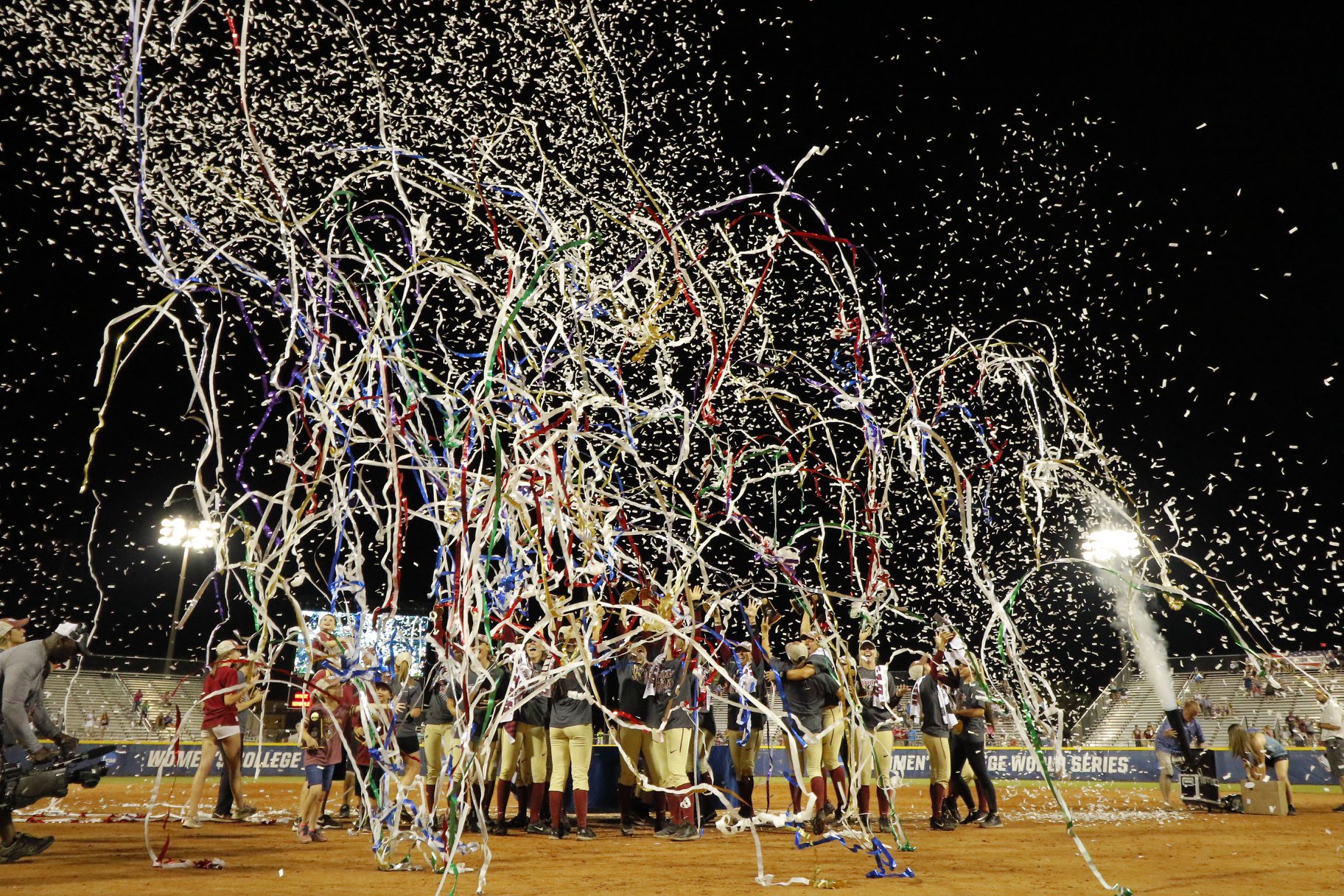 Maury Neipris/FSU athletics
Maury Neipris/FSU athleticsFew collegiate athletes ever get the thrill of being called national champions. Even fewer get the opportunity to try to defend their titles.
That was the prospect that faced Florida State softball since the second weekend in February. Last season, the Seminoles won their first national title as an NCAA fastpitch program and hoped do it again after before falling to Oklahoma State in the decisive game of the Tallahassee Super Regional on Saturday.
No two college teams are ever exactly the same. Justin Shanks was a redshirt freshman defensive tackle on FSU’s 2013 national championship football team before returning as a redshirt sophomore in 2014. That year, the Seminoles reached the Rose Bowl or national semifinal before falling to Oregon, 59-20.
The 2013 national championship was one of the more dominant runs in college football history. FSU started 13-0 in 2014, but had seven wins decided by one score and was forced to rally in the second half in six of those contests.
“That was probably the best senior leadership class that we had in 2013,” Shanks said. “Lamarcus Joyner, Telvin Smith, Terrence Brooks, those guys were leaders. We knew we had to work harder (in 2014). It’s definitely hard to repeat when everyone is expecting it.”
Atrews Bell was a wide receiver on Florida State’s 1999 national championship team. Although he enjoyed a breakout year in 2000, he doesn’t recall the team’s mindset coming into the season as much different. The target that comes with being the defending national champions, he said, existed before the title.
“I remember going into the 2000 season, Coach (Bobby) Bowden made it a point that it was a different team,” Bell said. “We had a lot of confidence and a lot of talent returning. Winning the national championship didn’t change much. With the North Carolinas, Wake Forests and NC States of the world, we were already their biggest game.”
Bell played during a run where FSU had finished in the top 5 in 14 straight seasons. In 2013, FSU won the national championship for the first time in 14 years and did it while starting the season outside the top 10. The following season, the Seminoles were preseason No. 1 in both polls.
“We could seem to turn in on when we wanted to,” Shanks said. “At the same time, you can’t always think (quarterback) Jameis (Winston) would bring us back. Every team we played had some type of trick they would use and they were constantly getting ahead. When you constantly do that to teams you should embarrass, the vibe is different. We wanted to dominate so bad that sometimes, we would lose focus. In the locker room after the close wins, sometimes it felt like we lost.”
In 2000, FSU returned to the national championship, but was unable to repeat. Both defeats that season came in Miami. After falling to rival Miami, 27-24, on a missed field goal as time expired in October, the Seminoles fell to Oklahoma, 13-2, in the Orange Bowl for the national title.
“I think we were just as hungry to win back-to-back championships as we were the first one,” Bell said. “When I came to Florida State, national championships were what was expected.”
During the Miami contest in October 2000, FSU fell behind 17-0 before rallying to take a 24-20 lead late. The Hurricanes would answer with a touchdown pass from Ken Dorsey to Jeremy Shockey before Florida State kicker Matt Munyon missed from 49 yards out as time expired.
“Even though we lost to Miami, we felt like we were a better team,” Bell said. “We went inside at halftime and made adjustments and thought we could come out and win.”
In the Orange Bowl against Oklahoma, Bell said that FSU was never able to adjust. The Seminoles were playing without All-American wide receiver Marvin Minnis and offensive coordinator Mark Richt, though present, had already accepted the head coaching job at Georgia.
“Mark Richt had took the Georgia job and I just felt like the offensive game plan and preparation was different,” Bell said. “The Oklahoma game, we just didn’t adjust.”
As for the 2014 team, the Seminoles entered the Rose Bowl having won 29 straight games. FSU pulled to within five early in the second half at 25-20, but that was when the wheels fell off for the Seminoles behind five second-half turnovers.
“That was one of the few times we played against a team with a quarterback as good as ours,” Shanks said of 2014 Heisman Trophy winner Marcus Mariota. “I had a feeling that we could come back, but we got frustrated and some of our guys mentally shut down. There was a few guys who took it hard. You didn’t want to go out that way and get embarrassed the way we did.”
Shanks said the loss lingered for different amounts of time for different players. In hindsight, the loss was the end of a run that produced 29 straight victories, three straight ACC championships and three top-10 finishes.
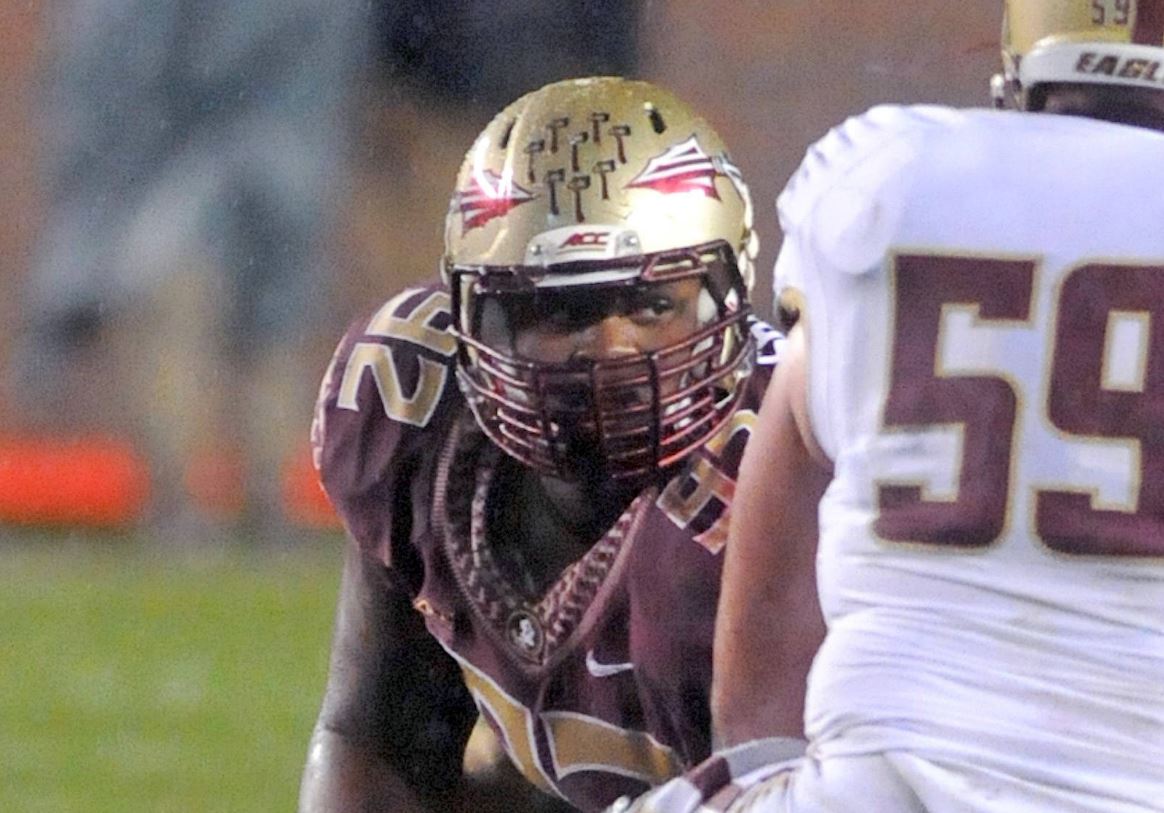
Defensive tackle Justin Shanks appeared in 10 games for FSU in 2013 and 2014. (FSU athletics)
“You had to remind yourself,” he said. “It might not have sunk in for some of us that it really happened until a day or two later.”
For the 2000 team, the loss to Oklahoma ended a run of 14 straight top-5 finishes. Sandwiched around the national championship of 1999 were losses in the title game to Tennessee in 1998 at the Fiesta Bowl and the aforementioned Orange Bowl against Oklahoma in 2000.
FSU was without starting quarterback Chris Weinke late in 1998, won three games by one score and was forced to rally from a fourth-quarter deficit in the Sugar Bowl against Virginia Tech for the 1999 title and was maybe just a couple plays from going undefeated in 2000. Bell noted that only a handful of plays over those three seasons was the difference between a 3-peat or perhaps no title at all.
“The ’99 year, we had the Peter Warrick and Laveranues Coles off-the-field incident,” Bell said. “The younger guys had to play a little more and I think that brought us all a little closer as a team. There’s so many things that had they gone this way, we might talking about Bowden not winning the big one. Think about Mark Richt not going to Georgia or if Munyon had made the kick, we might be talking about a repeat.”
The Daily Nole reached out to members of Florida State’s 1993 national championship football team and FSU soccer’s 2014 national title team, but they could not be reached. Like last season’s softball team, both of those teams were the first to win a national championship for their respective programs.
As for FSU softball, the Seminoles couldn’t muster up any more postseason magic after winning six straight elimination games last season. It goes to show how difficult repeating as national champions can be. FSU hasn’t had a program repeat as national champions since the men’s outdoor track and field team 3-peated from 2006 to 2008, although an academic cheating scandal forced the Seminoles to vacate the 2007 title.
“The biggest thing is not to be scared of pressure,” Shanks said. “You can’t be scared to be great. A lot of people hate them, but you can’t get mad at Golden State (Warriors) or the (New England) Patriots. The hardest thing in life is to be consistent.”
Mike Ferguson is the editor of The Daily Nole. Follow Mike on Twitter @MikeWFerguson. Like The Daily Nole on Facebook. To pitch an idea, author a post or to learn more about The Daily Nole, email Mike Ferguson at Mike@TheDailyNole.com.
Related Posts
One Comment
You must be logged in to post a comment Login
Leave a Reply
Cancel reply
You must be logged in to post a comment.
About Mike Ferguson
Mike Ferguson is the editor of The Daily Nole and former editor of Noled Out. Mike has more than seven years experience as a sports writer including the last four in print and online media. Mike graduated from Florida State University in 2009 with a Bachelors in Religion and a minor in Communications. Mike provided press coverage of Florida State's run to the 2013 BCS National Championship. Mike is also a news reporter at Polk County's newspaper, The Ledger in Lakeland, Florida. and contributes to Athlon Sports and ACCSports.com. Mike has been featured on sites as prominent as Yahoo Sports, FoxSports.com, Associated Press and the front page of SI.com while interviewing athletes as high profile as 2013 National League MVP, Andrew McCutchen. Email Mike at Mike@TheDailyNole.com. Follow Mike on Twitter @MikeWFerguson.

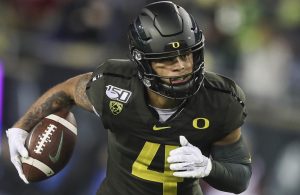
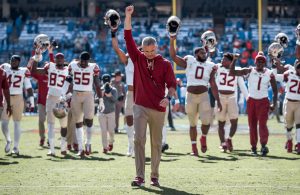
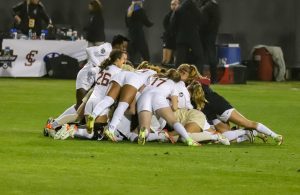
Pingback: Sunday Centerpiece: The Mindset Behind a National Title Defense – The Daily Nole | Marketing Affiliate Website